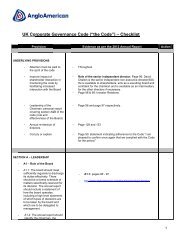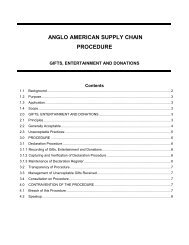Download PDF - Kumba Iron Ore
Download PDF - Kumba Iron Ore
Download PDF - Kumba Iron Ore
Create successful ePaper yourself
Turn your PDF publications into a flip-book with our unique Google optimized e-Paper software.
PRINCIPAL ACCOUNTING POLICIES<br />
FOR THE YEAR ENDED 31 DECEMBER 2011<br />
PRINCIPAL ACCOUNTING<br />
POLICIES<br />
1. GENERAL INFORMATION<br />
<strong>Kumba</strong> is the holding company of the <strong>Kumba</strong> Group. <strong>Kumba</strong> is a<br />
mining group of companies focusing on the exploration, extraction,<br />
beneficiation, marketing, sale and shipping of iron ore. <strong>Kumba</strong><br />
produces iron ore at Sishen and Kolomela mines in the Northern<br />
<br />
<strong>Kumba</strong> is a public company which is listed on the JSE Limited and is<br />
incorporated and domiciled in the Republic of South Africa.<br />
2. BASIS OF PREPARATION<br />
2.1 Accounting framework<br />
The consolidated financial statements are prepared in accordance<br />
with International Financial Reporting Standards (IFRS) and<br />
International Financial Reporting Interpretation Committee (IFRIC)<br />
interpretations of those Standards, the South African Companies<br />
Act No 71 of 2008, as amended, the Listings Requirements of the<br />
JSE Limited, and the AC 500 standards as issued by the Accounting<br />
Practices Board (APB).<br />
The financial statements have been prepared in accordance with the<br />
historical cost convention except for certain financial instruments,<br />
biological assets and share-based payments which are measured<br />
at fair value. The consolidated financial statements are prepared on<br />
the basis that the group will continue to be a going concern. These<br />
accounting policies are consistently applied throughout the group.<br />
The following principal accounting policies and methods of<br />
computation were applied by the company and the group in the<br />
preparation of the consolidated and stand-alone financial statements<br />
for the financial year ended 31 December 2011. Except as disclosed<br />
below, these accounting policies are consistent in all material<br />
respects with those applied for the year ended 31 December 2010.<br />
2.2 Statement of compliance<br />
2.2.1 ADOPTION OF AMENDMENTS TO EXISTING<br />
ACCOUNTING STANDARDS<br />
The following amendments and revisions to issued accounting<br />
standards which are relevant to the group were adopted and are<br />
effective from 1 January 2011:<br />
IAS 24, Related party disclosures (amendment)<br />
This amendment simplifies the definition of a related party, clarifying<br />
its intended meaning and eliminating inconsistencies from the<br />
definition and provides a partial exemption from the disclosure<br />
requirements for government-related entities. This amendment did<br />
not have a significant impact on the reported results for the year<br />
ended 31 December 2011.<br />
Annual Improvements Project 2010<br />
The group adopted the amendments to various issued accounting<br />
standards issued by the International Accounting Standards Board<br />
(IASB) as part of its Annual Improvements Project 2010 that are<br />
effective for reporting periods that commenced on 1 January 2011.<br />
These amendments did not have an effect on the reported results or<br />
the group accounting policies.<br />
Other<br />
A number of other amendments to accounting interpretations issued<br />
by the IASB were applicable for annual periods beginning on or after<br />
1 January 2011 and have consequently been adopted. They have<br />
not had a material impact on the accounting policies, methods of<br />
computation or presentation applied by the group.<br />
2.2.2 NEW ACCOUNTING STANDARDS AND<br />
INTERPRETATIONS NOT YET ADOPTED<br />
At balance sheet date, the following new standards, revisions and<br />
amendments to issued accounting standards and interpretations,<br />
which are relevant to the group but not yet effective, have not been<br />
adopted by the group:<br />
IFRS 9, Financial Instruments: Classification and Measurement<br />
IFRS 9 is the first step in the process to replace IAS 39, ‘Financial<br />
Instruments: Recognition and Measurement’. IFRS 9 introduces new<br />
requirements for classifying and measuring financial assets, financial<br />
liabilities, derecognition and hedge accounting. The standard is not<br />
applicable until 1 January 2013 but is available for early adoption.<br />
IFRS 9 requires all recognised financial assets that are within the<br />
scope of IAS 39 to be subsequently measured at amortised cost<br />
or fair value. With regards to financial liabilities, the accounting for<br />
changes in the fair value of a financial liability that is designated as<br />
at fair value through profit or loss and are attributable to changes<br />
in the credit risk of that liability are recognised in comprehensive<br />
income, unless it creates or enlarges an accounting mismatch in<br />
profit or loss.<br />
It is anticipated that IFRS 9 will be adopted in the group’s<br />
consolidated financial statements for the annual period beginning<br />
1 January 2013. It is not anticipated that the application of the<br />
new standard will have a significant impact on amounts reported<br />
in respect of the group’s financial assets and financial liabilities as<br />
the majority of financial assets and financial liabilities are carried at<br />
amortised cost as disclosed in note 29. However, it is not practicable<br />
to provide a reasonable estimate of that effect until a detailed review<br />
has been completed.<br />
IFRS 10, Consolidated financial statements<br />
This standard builds on existing principles by identifying the concept<br />
of control as the determining factor in whether an entity should be<br />
included within the consolidated financial statements. The standard<br />
provides additional guidance to assist in determining control where<br />
this is difficult to assess. The standard is effective for annual periods<br />
beginning on or after 1 January 2013.<br />
Audited annual financial statements<br />
Annual Financial Statements 2011<br />
27


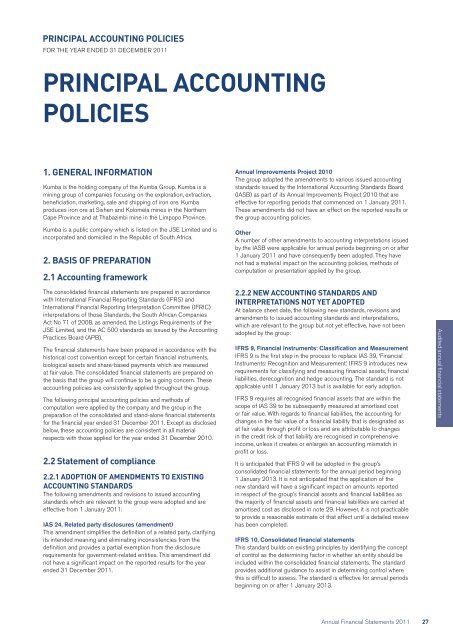
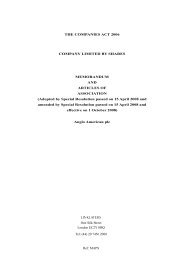
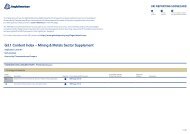
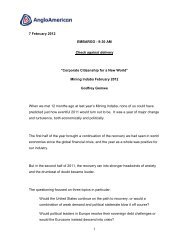


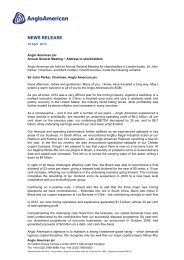
![English PDF [ 189KB ] - Anglo American](https://img.yumpu.com/50470814/1/184x260/english-pdf-189kb-anglo-american.jpg?quality=85)



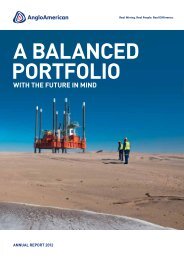
![pdf [ 595KB ] - Anglo American](https://img.yumpu.com/49420483/1/184x260/pdf-595kb-anglo-american.jpg?quality=85)
![pdf [ 1.1MB ] - Anglo American](https://img.yumpu.com/49057963/1/190x240/pdf-11mb-anglo-american.jpg?quality=85)
